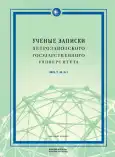INTERMEDIAL INTENTIONS OF THE MYTH OF ORPHEUS IN THE CULTURAL CONTEXT OF THE XX AND EARLY XXI CENTURIES
- Authors: Menshchikova M.K.1
-
Affiliations:
- Lobachevsky State University of NizhnyNovgorod
- Issue: Vol 46, No 1 (2024)
- Pages: 82-88
- Section: Articles
- URL: https://journal-vniispk.ru/2542-1077/article/view/293259
- DOI: https://doi.org/10.15393/uchz.art.2024.995
- ID: 293259
Cite item
Full Text
Abstract
The article explores the tendencies of audio-visual reception of the myth of Orpheus, that have beenreflected in the modern culture. The relevance of the work is determined by the interest of various national cultures andhistorical eras in ancient Greek mythology as a system of cultural codes. The research focuses on the polyvariance ofthe myth and its intermedial intentions, which together lead to the emergence of a new type of communication and away of “making a statement”. From this perspective, the myth of Orpheus is considered to be the most representative.The article is aimed at systematizing the main trends in the reference to the “Orphic code” in the cultural space of the XX and early XXI centuries. The methodological base is determined by the specifics of the analysis of syncretic forms of art and the identification of their polycode basis. The study draws a conclusion that the culture of the XX and early XXI centuries saw a gravitation towards the audio-visual models of the embodiment of the myth of Orpheus, which was determined by the intermedial intentions inherent in it and in the “precedent texts”.
About the authors
M. K. Menshchikova
Lobachevsky State University of NizhnyNovgorod
Author for correspondence.
Email: menschikova@flf.unn.ru
Dr. Sc. (Philology)
References
- Asoyan, A. A. Semiotics of the myth of Orpheus and Eurydice. St. Petersburg, 2015. 136 p. (In Russ.)
- Blinova, D. D., Tukova, T. V. Playing Orpheus (on H. Birtwistle’s opera “The Mask of Orpheus”). South-Russian Musical Anthology. 2021; 4: 83–90. doi: 10.52469/20764766_2021_04_89 (In Russ.)
- Bobrova, M. S. Alexander Zhurbin’s rock opera “Orpheus and Eurydice”: dramatic art problems. The Bulletin of Adyghe State University. Series 2: Philology and the Arts. 2011; 4: 172–175. (In Russ.)
- Bolnova, E. V. Mythological and cultural components of the “Orpheus & Eurydice” hippopera by Noize MC. Palimpsest. 2019; 4: 120–138. (In Russ.)
- Wagner, R. The Ring of the Nibelung. Selected works. St. Petersburg, 2001. 798 p. (In Russ.)
- Gnezdilova, E. V. Mythology of Orpheus in classical cultural tradition. The Problems of Historical Poetics. 2021; 19(3): 35–52. (In Russ.)
- Levi-Strauss, C. Mythologiques: In 4 vols. Vol. 1. Moscow; St. Petersburg, 2000. 398 p. (In Russ.)
- Losev, A. F. Music as a subject of logic. Moscow, 2012. 205 p. (In Russ.)
- Matusevich, A. P. Evolution of Alexander Zhurbin’s musical theatre: from “Orpheus and Eurydice” to “Love’s Metamorphoses”. Manuscript. 2020; 13(12): 184–189. (In Russ.)
- Nikulina, I. N., Simonets, M. S. The intermediality of the myth “Orpheus and Eurydice”. In: Dialogue with antiquity in the interdisciplinary context. Nizhny Novgorod, 2023. P. 11–17. (In Russ.)
- Nietzsche, F. The Birth of Tragedy out of the Spirit of Music. St. Petersburg, 2014. 219 p. (In Russ.)
- Predolyak, A. A. The myth of Orpheus in Harrison Birtwistle’s opera The Mask of Orpheus as a dialogue of epochs. In: Contemporary aspects of the dialogue of literature, music, and fine arts in the space of Western European and Russian musical cultures: Proceedings of the II All-Russian Research and Practice Conference with International Participation. Krasnodar, 2020. P. 184–191. (In Russ.)
- Tsvigun, T. V., Chernyakov, A. N. The myth as a source of cultural legitimation: the rock and hip-hop versions of the legend of Orpheus and Eurydice. IKBFU’s Vestnik. Series: Philology, Pedagogy, Psychology. 2019; 4: 81–92. (In Russ.)
- Schelling, F. W. Philosophy of art. Moscow, 1966. 488 p. (In Russ.)
Supplementary files








